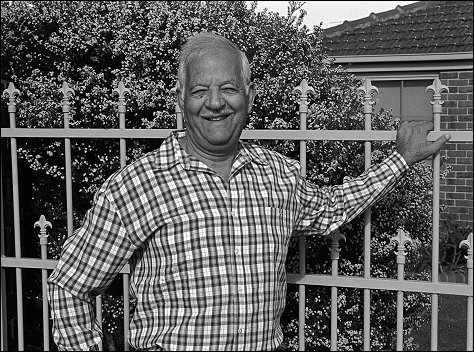Andreas

Photograph, Kris Reichl.
I left Cyprus during the troubles of 1974. The island was at war and divided in two. My home was in the section occupied by the United Nations and the Turkish Army. The other part of the island was occupied by the Greek Army. But during the war I lost my home, my property and my job so I decided to come to Australia as a refugee. I had no other choice.
I arrived in Australia in January 1976 with my wife, daughter and young son. My wife’s brother lived in Australia and I had heard a little bit about the country. When we arrived it seemed very green but I couldn’t understand the weather. In Cyprus we had very stable seasons - three months of autumn, three months of winter, three months of spring and three months of summer. In Melbourne the weather continually changes. One day after we arrived I was swimming in the sea at lunch time and it was thirty-five degrees but by four o’clock the sky was black and it was hailing. In Melbourne you need an umbrella for the sun and an umbrella for the rain - all in the same day.
I was 41 when we came to Australia and spoke only Greek. All around me people were speaking a different language and this didn’t make me feel very good. If I went shopping I had to find a Greek shop because I couldn’t speak to anybody. Some people were helpful but others laughed and I felt stupid.
It was very difficult for me to find a good job. I was working in a dye factory making dyes for printing clothes and I didn’t even know the words for ‘yellow’, ‘green’ and ‘blue’. If you can’t write and can’t speak English, how can you have a responsible job? I could only find heavy, dirty work.
But I decided that this was my country and I had to learn English or return to Cyprus. My son was learning English at school and he would come home and say to me, “What is your name, what is your name?” like a parrot, until finally I could say it too. When we played together I pinched English words from him. I was like a thief waiting to steal. Slowly, slowly, slowly I learnt the English language.
After I had been in Australia for about eight years, I decided to leave my job at the dye factory because working with chemicals was very unhealthy. By that time I could speak a little English so I found it easier to get work. I got a job as a metal worker and later worked as a setter for a printing press. I worked six days a week, including Saturdays, to give my kids a good education and to make a home for my wife. Money doesn’t come easy.
I built my house in Clarinda ten years ago and I will never move again. I think I will die here. Immigrants live in Clarinda because it is a fairly cheap area. Rich people don’t want to live here because they don’t want their kids to play with poor people’s children.
I am secretary of a group for retired Greek people in Clayton. Many of the people in this group come from Greece and can’t speak very much English. Some have lost their husbands or wives and they stay at home by themselves without speaking to anyone. The loneliness is killing people.
We come together to talk about our families and exchange views. Sometimes we get a bus and go on an excursion and we feel like we are doing something and are not finished or dead.
I don’t find the system in Australia very different from Cyprus, which was a Commonwealth country with English courts and laws. But things are certainly more orderly here. Everybody stands in lines waiting for buses or in shops and I like this.
Some things about the Australian people I do find very different. Greek people are more joined as a family than Australian people. Greek families are always doing things together - eating, singing, dancing. No matter how old my children were I would never kick them out of home. I’d help them find jobs and give them money. But Australians expect their children to take responsibility for their lives.
Three or four years ago I went back to Cyprus. I couldn’t go to my old home because the Turkish army still occupy that area but I went nearby. There was no water and the orchards were dead. For so long I had dreamt about going back to Cyprus but when I saw the country I thought “Why?” I asked my daughter who has travelled in France, Greece, America and Cyprus, if Australia was a good place to live. She said yes, so I think I made the right decision.
I believe my kids feel this country belongs to them and it belongs to me too now. I worked here for many years. I get the pension. I have a house and a family so I will stay here. But I was born in Cyprus and lived there for forty-one years. I have a lot of memories.
